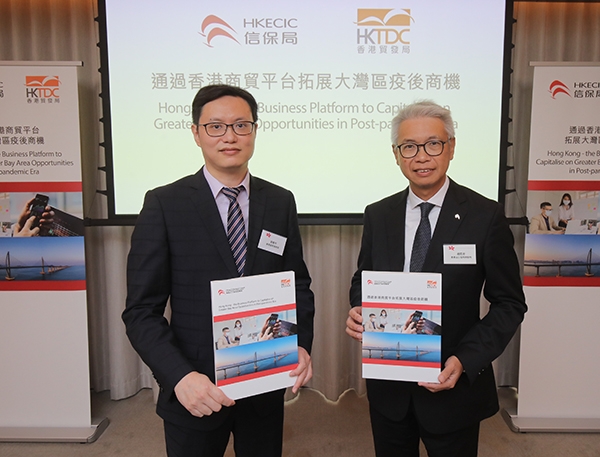As global financial woes blunt overseas markets, Hong Kong firms are looking to Mainland China, and especially the Guangdong-Hong Kong-Macao Greater Bay Area (GBA), but are faced with several challenges, a survey shows.
The Hong Kong Export Credit Insurance Corporation (HKECIC) and the Hong Kong Trade Development Council (HKTDC) have, in their first such cooperation, jointly released a survey study – Hong Kong – the Business Platform to Capitalise on Greater Bay Area Opportunities in the Post-pandemic Era. The report found that Hong Kong companies face three major challenges: low-price competition, unfamiliarity with the legal/regulatory regimes in the mainland and financing and customer credit risks. However, opportunities coexist alongside the challenges. The companies surveyed said Hong Kong enterprises had considerable advantages in the GBA market, including Hong Kong's brand reputation and capacity to bring in high-quality foreign products. As such, Hong Kong companies are advised to make good use of their advantages and use the GBA as a springboard to further develop the huge domestic sales market in the mainland, while diversifying the risks of relying on the international market.
Port in a storm
Terence Chiu, Commissioner, HKECIC, said: “The HKECIC and the HKTDC have jointly conducted a research study for the first time as many parts of the world, including Hong Kong and the mainland, see economic and trade activities gradually restarting. Given uncertainty in overseas markets, such as Europe and the United States, the domestic market in the mainland can provide another option for Hong Kong companies, with the GBA being the ideal springboard. The HKECIC has always attached great importance to the mainland market and began to underwrite buyers decades ago, and indeed the mainland is now our biggest insured market after the United States. Riding on the development of the GBA, we will continue to support Hong Kong companies to seize the opportunities offered through the dual circulation strategy that can help them develop their business in the mainland market.”
Dr Patrick Lau, Deputy Executive Director, HKTDC, said: “With a GDP of about US$1.96 trillion and GDP per capita of over US$22,500, the GBA is clearly a bright spot for business growth amid challenging market conditions affected by the COVID-19 pandemic, geopolitical issues, interest rate hikes and inflation. The HKTDC has been strongly advocating the GBA, and our GoGBA digital platform has reached a viewership of more than 590,000 since its launch over a year ago, which demonstrates the business community’s keen interest in the GBA opportunity. The HKTDC is very pleased to work with the HKECIC to conduct this research to further understand the pain points and needs of Hong Kong companies in developing the GBA market, and to collect opinions from and brainstorm with industry experts so as to make the GBA opportunity accessible to more Hong Kong companies.”
In the third quarter of 2022, the HKTDC conducted a questionnaire survey on the Greater Bay Area Domestic Market Development Strategy, surveying 413 Hong Kong companies that have either started developing domestic sales in the GBA or are planning to do so. Over 95% of the surveyed companies said they face various challenges, particularly those related to the pandemic, such as disruptions in supply chain and production and sourcing activities as well as stringent border control measures. Declining orders from overseas markets and spiralling costs have also dented business development.
Almost 70% of the respondents have sold directly to mainland buyers. Based on the weighted average amount, sales to the mainland buyers account for 37.5% of the overall average annual sales of the respondents. Among them, over 90% have sold to Guangdong Province and the nine mainland GBA cities.

Top three cities
Shenzhen, Guangzhou and Dongguan are top three GBA cities in which Hong Kong companies have most interest
The mainland GBA cities in which the companies surveyed are most interested in expanding into include Shenzhen (73.8%), Guangzhou (68.8%) and Dongguan (43.6%). Hong Kong companies mainly plan to sell products manufactured or sourced by them in the mainland as well as goods purchased from abroad to the GBA.
For sales channels, most of them sell to the mainland importers and wholesalers (48.2%) and other business-to-business (B2B) channels. Almost 40% also sell directly to mainland consumers through websites or third-party platforms. Less than 14% of the surveyed enterprises have so far embarked on using e-commerce and internet applications to directly develop the GBA market. However, 65.1% would consider using these e-commerce applications to explore the mainland market directly in the future.
Unfamiliarity with operation of the mainland domestic market is biggest pain point for Hong Kong companies
Many survey respondents said they encounter various difficulties in expanding sales in the GBA, such as the mainland market being flooded with cheap products (36.8%) and an unfamiliarity with mainland laws and regulations and product standards (35.8%). Some Hong Kong companies also mentioned issues relating to financing and customer credit (25.9%), including the lack of information on the credit background of mainland clients, capital shortage (23.5%), and the high risks of sales on credit (22.0%).
In addition, most Hong Kong companies would demand the buyer make an advance payment (57.9%) or they would choose to bear the risks themselves (43.6%) in managing accounts receivable in mainland domestic sales. There are also a number of Hong Kong companies which buy credit insurance (14.0%) either directly in Hong Kong or through banks in Hong Kong.
To deal with the challenges involved, the companies surveyed said they need various support services, including promotion activities targeting mainland markets to identify buyers (33.2%) and marketing strategies for the GBA/Guangdong Province (31.5%). They also need support for a variety of financing and risk management services.
Hong Kong enterprises have unique advantages
In addition to the questionnaire survey, the HKTDC also conducted in-depth interviews with nine selected Hong Kong companies and industry representatives to better understand the views of the trade on how to bolster sales in the GBA.

Irina Fan, Director of HKTDC Research, said: “Hong Kong companies should make more use of innovative technologies to map out e-commerce solutions and build integrated online/offline sales channels in regard to domestic sales in the mainland, enhancing their production and operational efficiency to help them seize GBA opportunities in the post-pandemic era.”
The companies surveyed believe Hong Kong possesses various advantages in developing the GBA domestic market, including the good reputation enjoyed by Hong Kong brands or Hong Kong products on the mainland (48.4%), and Hong Kong being good at bringing in quality and trendy products from overseas (43.3%).
The report also showed that products that are “Made in Hong Kong”, “Made by Hong Kong” and “Designed by Hong Kong” are all well received in the Mainland market. As such, Hong Kong companies should formulate the right business strategy targeting the domestic market as part of their plan to develop the GBA market.
Related links
Full report
HKECIC

